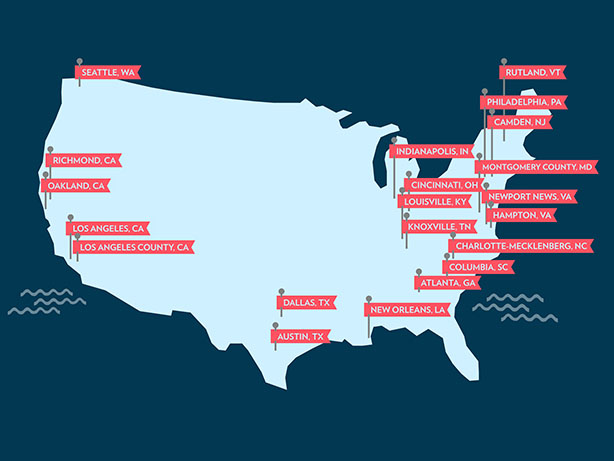Using Data and Technology to Advance Community Policing
We’ve launched a Police Data Initiative that’s helping … innovative cities use data to strengthen their work and hold themselves accountable by sharing it with the public.
-President Obama
Two weeks ago, in Camden, NJ, the President announced the launch of the Police Data Initiative. The effort is a fast response from the White House, working with 21 leading police departments across the country, to the President’s Task Force on 21st Century Policing, which made recommendations encouraging better use of data and technology to build community trust and reduce inappropriate uses of force.
Six weeks before the President’s announcement, police chiefs were invited to the White House, along with municipal Chief Technology Officers and other leaders from cities and counties across the nation. These people represented jurisdictions that are already taking action or seeking to act on improving policing outcomes through responsible, innovative use of data and technology. The White House event advanced the conversation by bringing these leaders together with technologists, data scientists, law enforcement experts, philanthropists, and others.
Discussions focused on specific actions that police departments can take to make progress in these areas. The collaboration generated multiple commitments to action that were announced the same day as the President’s speech, and, the White House is working with the police departments and other partners now to drive quick implementation.

Graphic created by Presidential Innovation Fellow Christopher Wong.
Addressing Key Challenges
The Administration recognizes the importance of working with cities and police departments to overcome challenges to progress. The White House meeting enabled Police Chiefs and technologists to discuss challenges and solutions to key questions. These included:
- Data Supply Chains: How can police departments work best across the full life cycle of police data, including collection, storage, retention, and decisions about release?
- Balancing Privacy and Access: How can police departments share incident-level data in a way that balances privacy with transparency?
- Data as Dialogue: How can we use the public release of data, and transparency more generally, as a starting point for conversations between police and the community?
- Data Analysis: How can innovations in data science be incorporated in police departments to support internal accountability and increase trust within the community?
These questions were chosen to represent many of the difficult considerations that exist around collecting, releasing, and contextualizing data around police community interactions.
The Police Data Census
Participants at the White House event also identified a need to better understand the current state of policing open data, including what is available and in what forms. As such, the Code for America team working in Indianapolis, IN took the lead on creating a Police Open Data Census that attempts to capture and visually display information about what is available nationally.
We look forward to continuing to work with police departments, cities, and communities to build on these efforts.
David Wilkinson is Director of the White House Office of Social Innovation and Civic Participation.
Clarence Wardell is a Presidential Innovation Fellow.
White House Blogs
- The White House Blog
- Middle Class Task Force
- Council of Economic Advisers
- Council on Environmental Quality
- Council on Women and Girls
- Office of Intergovernmental Affairs
- Office of Management and Budget
- Office of Public Engagement
- Office of Science & Tech Policy
- Office of Urban Affairs
- Open Government
- Faith and Neighborhood Partnerships
- Social Innovation and Civic Participation
- US Trade Representative
- Office National Drug Control Policy
categories
- AIDS Policy
- Alaska
- Blueprint for an America Built to Last
- Budget
- Civil Rights
- Defense
- Disabilities
- Economy
- Education
- Energy and Environment
- Equal Pay
- Ethics
- Faith Based
- Fiscal Responsibility
- Foreign Policy
- Grab Bag
- Health Care
- Homeland Security
- Immigration
- Innovation Fellows
- Inside the White House
- Middle Class Security
- Open Government
- Poverty
- Rural
- Seniors and Social Security
- Service
- Social Innovation
- State of the Union
- Taxes
- Technology
- Urban Policy
- Veterans
- Violence Prevention
- White House Internships
- Women
- Working Families
- Additional Issues

